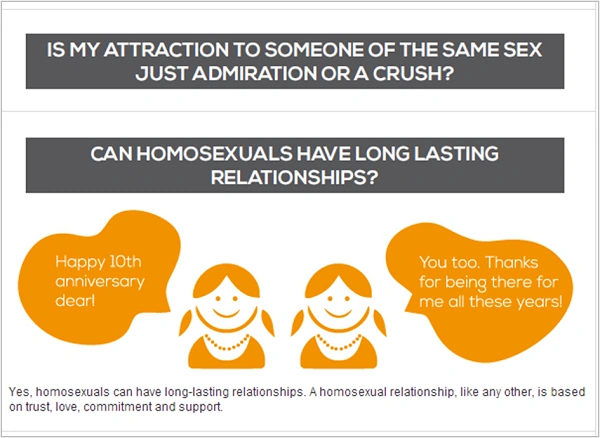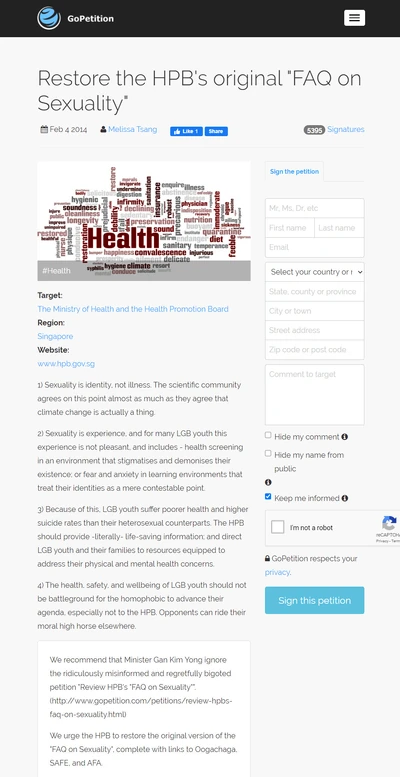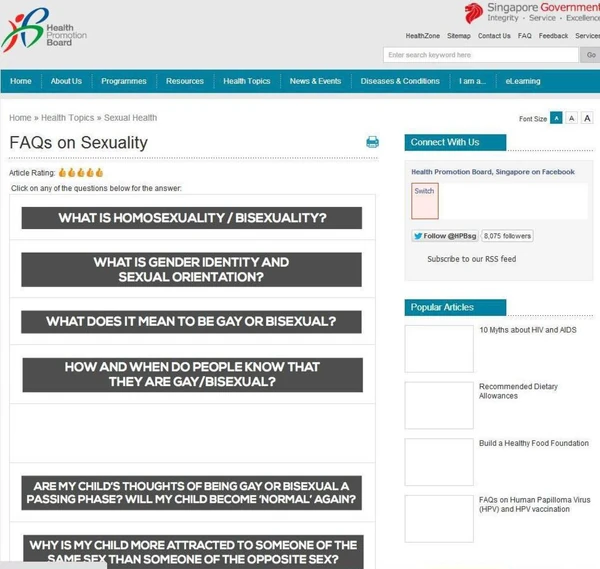In early February 2014, a set of Frequently Asked Questions (FAQs) on sexuality on the website of the Health Promotion Board (HPB) became the focus of two petitions – one asking the “elected government of Singapore” to “do thorough comprehensive research before they took such a committed stand as taken by the Health Promotion Board”, while another urged the HPB to restore the original version of the “FAQ on Sexuality”.
The FAQs were published by the HPB in late January 2014. In the online document, the Board addressed the issue of homosexuality and provided its answers to questions about the topic. These questions included: “What is homosexuality/bisexuality?”; “Am I normal? Is being gay or bisexual a mental illness? Do I need to seek medical help?”; “Can homosexuals have long-lasting relationships?”
The HPB’s answer to the last question was:
“Yes, homosexuals can have long-lasting relationships. A homosexual relationship, like any other, is based on trust, love, commitment and support.”

The FAQs were welcomed by activists and supporters from the LGBT community.
A Pink Dot spokesperson described the information in the FAQs as “objective and aligned with globally accepted scientific standards”, and commended the government on it.
“LGBT individuals are often marginalised in society, with misinformation and prejudice perpetuating the stigma of being LGBT in Singapore,” the spokesperson said.
The Executive Director of LGBT counselling service Oogachaga, Bryan Choong, said that young people could get appropriate information about sexuality from the set of questions and answers, which included URL links to websites, such as SAFE Singapore, Action for AIDS, and Oogachaga, which provided advice or support to homosexual persons.
The FAQs, however, also attracted condemnation and disapproval from others.
A petition, apparently set up by a person called “Aaron”, on 3 February 2014, called on the Minister for Health, Gan Kim Yong, “to conduct a thorough, non-biased, comprehensive review of the website’s information as it dangerously promotes homosexuality.”
“The Sexuality FAQ presented on Health Promotion Board’s website is questionable and objectionable,” the petition said. “It has an implicit pro-homosexuality stance which I believe is detrimental to our society.”
It said the FAQs published by the HPB were not only “an irresponsible act” but that it was “also a misuse of their public service position, platform and a blatant betrayal of public trust.”
It added, “Following public moods, popular trends or making unsubstantiated statements will not help to bring clarity on the issue at all, nullifying the very purpose of the FAQ itself.”
In the latest updated version of the FAQs on the HPB website – the update was apparently made on 3 February 2014, the same day the petition by “Aaron” was set up – the HPB seems to have made several changes to the set of Q&A, in particular removing the mention of and links to the LGBT websites.
These are screenshots of the original postings and their edited versions:


The omission of the URL links to the LGBT support sites prompted another petition to the HPB to restore the links[1].
Set up on 4 February by Melissa Tsang, this counter-petition said, “We recommend that Minister Gan Kim Yong ignore the ridiculously misinformed and regretfully bigoted petition “Review HPB’s “FAQ on Sexuality””.
Supporting the original FAQs, it explained that LGB[T] youth “suffer poorer health and higher suicide rates than their heterosexual counterparts.”
“The HPB should provide – literally – life-saving information; and direct LGB youth and their families to resources equipped to address their physical and mental health concerns.”
The petition said that health, safety, and wellbeing of LGB youth should not be battleground for the homophobic to advance their agenda, especially not to the HPB.
“Opponents can ride their moral high horse elsewhere,” it said.
“We urge the HPB to restore the original version of the “FAQ on Sexuality”, complete with links to Oogachaga, SAFE, and AFA.”
On its Facebook page, the HPB stated it “will take into consideration relevant inputs and feedback in our continual review of our public education resources.”
It added, “We would like to reiterate that the family remains the basic building block of our society. This means encouraging heterosexual married couples to have healthy relationships and to build stable nuclear and extended family units.”
On Wednesday, 5 February 2014, Daniel Goh, a Non-constituency Member of Parliament (NCMP) and an associate professor at the Department of Sociology of the National University of Singapore, shared his views on the Health Promotion Board (HPB)’s 'FAQs on Sexuality' on his Facebook page[2],[3]:

"Daniel Goh 吴佩松
February 5, 2014 · Shared with Public
Looks like there is some kind of campaign against this excellent HPB website for the FAQs on homosexuality. ST journalists must have gotten wind of it and asked me several questions in my professional capacity as a sociologist through email on Tuesday afternoon.
This was my reply, with ST journalist questions abbreviated and paraphrased (warning: long post).
1) What do you think of the FAQs?
I think the FAQs are very factual and reflect the current social scientific and scientific understanding of homosexuality. I don't find it surprising at all and not progressive, but objective.
2) What do you make of the timing of this?
I am wondering what took so long. I believe government agencies should operate on the basis of facts and not the prejudices of society whichever way they bend. I think it would be speculation to interpret the timing of the FAQs as linked to society's views and prejudices. If anything, I think society has become quite pluralistic when it comes to sexuality and a whole range of views exist. If government agencies adopt the point of view of a particular segment, it will just produce or exacerbate conflicts and misunderstandings. Agencies should go by facts, which is what HPB is doing.
3) Do you think the FAQs reflect or contradict the government's pro-family policy?
I don't see any contradiction. Informing people about concerns and facts about homosexuality is to acknowledge the incontrovertible reality of homosexuality. It doesn't undermine healthy relationships between married heterosexual couples at all. If it offends someone's individual sensibility, then it is just that, offending an individual, not hurting a relationship between two heterosexual partners.
In fact, I think informing people about homosexuals actually helps promote the family as a basic building block of society, as it helps parents and other family members understand and accept homosexuality as a fact. This reduces discord and strengthens family bonds, making for a stronger society where homosexuals do not feel ostracized and alienated through no fault of their own.
4) Do you think the FAQs achieve the goal of STD education?
I think it does, because it helps clarifies misperception that AIDS is a homosexual disease, and directs our understanding of STDs as linked to risky sexual behavior of having unprotected sex with multiple partners regardless of sexual orientation.
The only criticism I have is the factoid on the increase in homosexuals being tested positive for HIV. The increase was only in 2011 and HPB should be more circumspect and not appear to frame it as a trend -- we don't know yet until more data is available. Overall, I like the FAQs very much and am very impressed by HPB's clarity and balanced objectivity."
On Thursday, 6 February 2014, Mountbatten MP Lim Biow Chuan hit out at the statement, which said homosexual and heterosexual relationships were not too different[4]. Writing on his Facebook page, he said: “I cannot agree that ‘A same-sex relationship is not too different from a heterosexual relationship’. The two relationships are different and they go against the Government’s policy of promoting heterosexual married couples to have healthy relationships and to build stable nuclear and extended family units. “I am utterly disappointed at the HPB’s stand in issuing such a statement,” said Lim, who has also filed a question asking the Health Minister to clarify his ministry’s stand on the board’s online resource when Parliament next sat on 17 February 2014.
Pastor Lawrence Khong of Faith Community Baptist Church also wrote, in the capacity as Chairman of church network LoveSingapore, a seven-page response against the “pro-LGBT (lesbian, gay, bisexual and transgender) view” in the HPB’s FAQ section, which was yesterday put up on the church’s website and Facebook page. These were countered by another petition started on Tuesday, 4 February 2014 in support of the board’s move, though it also called for the board to reinstate to the resource links to LGBT support groups that had allegedly been removed.
Lim Biow Chuan said that he learnt about the FAQ section a few days before when he received it in his email. He decided to make his Facebook posting because he felt the FAQ section “sends a wrong signal”. Noting that the bulk of the FAQ seemed to suggest that a homosexual relationship “is quite normal”, he added: “If we say a homosexual relationship is quite normal, then people get confused because that’s not the state’s pro-family position”.
The HPB said it had noted Lim’s feedback and reiterated that “family remains the basic building block of our society”. The board added that it would take into consideration relevant inputs it had received to see how it could further improve its communications as well as to better reach out to Singaporeans in their health promotion educational materials.
Lim also felt that some of the answers in the FAQ seemed to present opinions as facts. He cited the answer provided to the question “Can homosexuals have long-lasting relationships?”, which was: “Yes, homosexuals can certainly have long-lasting relationships. A homosexual relationship, like any other relationship, is based on values like trust, love, commitment and support.” He said there were no conclusive studies supporting this statement and added that it could have captured the diverse views on the issue. “From what I have read, there are really diverse opinions on it, so when there are diverse opinions, you have to be honest about it — that some people feel it this way, some people feel it the other way — and let readers judge for themselves,” he said. Nevertheless, Lim said some answers, such as the definitions of gender identity and sexual orientation, were informative.
Tampines GRC MP Baey Yam Keng also said he was “a bit surprised” when he saw that the HPB had posted the FAQ section. “It’s a bit bold of them to take this approach,” said Mr Baey, who previously had expressed support for the repeal of Section 377A, which criminalises sex between men. While he found some of the answers objective and explained in a clinical way, Baey felt there were some that were too simplistic and may lead to people making judgements that are not as well-informed. “For example, this point about the differences between same-sex and heterosexual relationships, I felt that the answer lacked another dimension, which is about the Asian values of family,” he said. He added that some social norms, such as how same-sex couples are not able to get married here, could have been reflected in the answers. “I think the HPB tried to take a neutral stance. But (by) being neutral, it would not have included certain social norms or mainstream values that are still quite prevalent in our society, so I think that is what irks some quarters of society.”
On 14 February 2014, PAP MP Hri Kumar Nair posted the following note on his Facebook page:
"In the last few days, I have received several email and other messages urging me to take a position on HPB’s FAQs on homosexuality. Taking one side, whatever the reason or basis, will alienate the other. That is why you have not heard a peep from the Workers’ Party MPs on this issue.
In contrast, my friend and PAP colleague Lim Biow Chuan has made his views clear and filed a Parliamentary Question for next week’s sitting. Baey Yam Keng has also weighed in on the matter.
Yam Keng and I, along with Charles Chong, were the only PAP MPs who argued against S.377A (which criminalises homosexual acts) during the 2007 parliamentary debate on the amendments to the Penal Code. Most of the PAP MPs who spoke supported it. The Workers’ Party MPs of course did not take a position.
I spoke against S.377A, not because I was in favour of any “gay agenda”, but because I thought it did not have the characteristics good laws should have. Chief among these was the Government’s declaration that the law would be retained but not enforced. In other words, my arguments were based on legal and jurisprudential grounds. In spite of this, I received criticism from some quarters for supporting or being sympathetic to homosexuals. At the same time, I also received invites from gay advocates to attend meetings. Everything was reduced to “us” or “them”.
Both camps want the Government to give legitimacy to their respective causes. This battle is not unique to Singapore - it is being fought in many other countries. Some have recognised gay marriages (eg. Canada, England, New Zealand), while others have gone the other way and enacted anti-gay laws or enhanced punishments for homosexual acts (eg. Russia, Uganda, Nigeria).
So what should we do? This is a complicated issue, and I am not afraid to say that I do not have an answer. One key question for me is whether homosexuality is genetic. MM Lee, who is far wiser than I can ever hope to be, had this to say in April 2007 about S.377A: “If in fact it is true, and I have asked doctors this, that you are genetically born a homosexual - because that's the nature of the genetic random transmission of genes - you can't help it. So why should we criminalise it?" His logic is infallible. If it is genetics, then discriminating against homosexuals is no different from discriminating on the basis of race or gender. And that possibility troubles me.
I am in no position to pass judgment on any one or any belief. But here are three things I hope will happen.
First, help must be given to those who need it. While many have framed the HPB issue as a pro-gay or anti-gay one, let us not forget the reason for the HPB FAQs in the first place: there are people in our society who have questions concerning their sexuality and who are deeply affected by it. Their needs should not be ignored. Nor should they (or HPB) become pawns in a larger game. We can question whether the FAQs should or could have been put across differently, but HPB should not retreat from its role to educate and help. We also need to provide a facility for those seeking advice or support. Again, we can debate who they should turn to – but ultimately, there has to be someone.
Second, we ought to have a frank conversation about our approach towards homosexuality. The furore over HPB’s FAQs raises the issue of the Government sending mixed messages to the public. But this is not an issue on which the Government can or should lead, and neither camp should demand that the Government bends to its will. It is for society to set the direction. And as time passes, as attitudes change and our knowledge of such matters grow, that direction will invariably change as well.
Last, the battle will not be resolved by the attacks that are usually associated with this issue – one side calling the other “evil, paedophiles and deviants”, and the other responding with “ignorant, religious bigots”. It may be how other societies deal with such issues, but we can and should strive to be different. Neither camp is going to persuade the other that it is right. And they would be wise to remember Newton’s Third Law – that for every action there is an equal and opposite reaction.
Let’s raise the level of this debate. Let’s not reduce this to “them” and “us”, but deal with it as fellow Singaporeans."
See also[]
- Daniel Goh's views on homosexuality
- Baey Yam Keng's views on LGBT rights
- Lim Biow Chuan's views on homosexuality
References[]
- https://www.onlinecitizenasia.com/2014/02/05/faq-on-sexuality-by-hpb-turns-controversial/
- https://www.todayonline.com/singapore/disappointed-mp-criticises-hpb-its-faq-sexuality
Acknowledgements[]
This article was written by Roy Tan.
